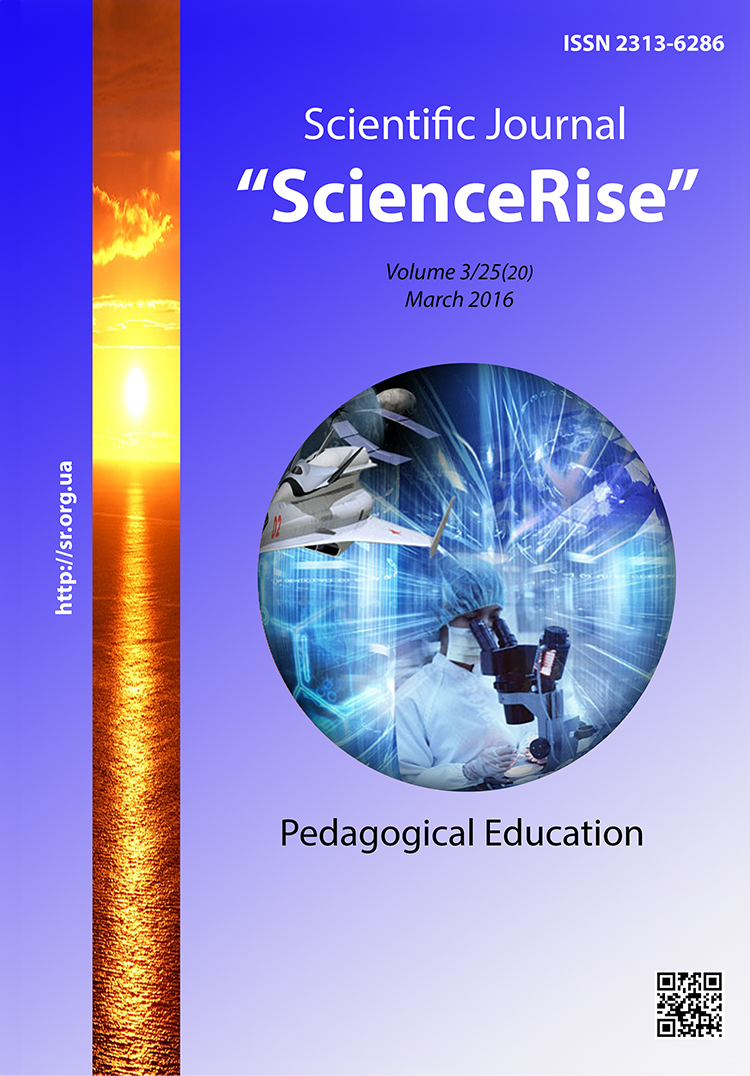The concept of the pedagogical system of the higher technical educational establishment: essential characteristics of its components
DOI:
https://doi.org/10.15587/2313-8416.2016.64818Keywords:
concept, the pedagogical system, upbringing, personality student, semantic core, components, scientific approachesAbstract
The article discusses the essential characteristics of the components of the concept of modern educational system of higher technical educational institutions.
We believe that the important role in organization of pedagogical system of the modern higher technical educational establishment belongs to qualitatively new approaches: humanistic and ideological, andragogical, facilitating, personal, cultural, diversificational, cordocentrism, systematic and activity approach, interactive.
The concept of pedagogical system will be effective, if the main fundamentals of the Concept are included into the plans of pedagogical work of the higher educational establishments and their structural subdivisions; if the organizational and methodological facilities and studying and generalizing of the experience in organization of the pedagogical activities in the other higher educational establishments are prepared; if the scientific and methodological conferences, seminars, round-table discussion meetings, trainings and so on are organized and held; if we promote active exchange of the theoretical and methodological aspects of the pedagogical system, of new approaches, forms and methods of the pedagogical activities; if we consider the questions of the Concept implementation at the meetings of the pedagogical work councils, educational and methodological commissions and the like.
The offered authors Concept of the pedagogical system of the higher technical educational establishment should help the educators modulate the pedagogical process, involve various institutions and the society to the active participation in the educational and pedagogical process.
References
Bech, I. D. (2003). Educating the individual: In 2 books. Book. 1. Personality oriented approach: theoretical and technological bases. Kyiv: Lybid, 280.
Andrushchenko, V. (2004). Pedagogy for All means of education of the individual state. Higher education Ukraine, 4, 41–45.
Karpenchuk, S. G. (2005). Theory and Methods of Education. 2nd edition. Kyiv: Higher HQ., 344.
Trotsky, G., Denisenko, A. (2007). Organization of educational work of curators in higher pedagogical educational institution. Three parts. Part 1. G. S. Skovoroda Kharkiv National Pedagogical University, 130.
Belova, L. A. (2005). Problems and objectives development of educational system of high schools. Multiversum. Philosophical almanac. Kyiv: Center of spiritual culture, 262.
Savosh, G. P. (2006). Features of educational work in higher technical education Ukraine: sociological analysis. Kharkiv Humanities University of "People's Ukrainian Academy", 232.
Fokin, G. (2002). Prepodavanye High society and of education in school. Methodology objectives and Content, Creativity. Moscow: Academy, 224.
Luchaninova, O. P. (2013). Educational system of higher education: a theoretical aspect of Pedagogy of formation of creative personality in higher and secondary schools, 31 (84), 300–309.
Meshchaninov, A. P. (2004). Modeling of systems development: a Training manual. Nikolaev: Publishing house of Moscow state mining University them. Peter Graves, 228.
Fullan, M. (2001). Change Forces : the sequel: TRANS. angl. Lviv: Chronicle, 162.
The image of man in the mirror of humanism: thinkers and teachers of the Renaissance of identity formation (XIV–XVII centuries) (1999). Moscow: Publishing house urao, 400.
Pylypko, E. V. Philosophy and education of today's youth. Available at: http://eprints.kname.edu.ua/30771/1/109.pdf
Frome, E. (1993). Escape from freedom. Reading on the history of philosophy: In 6 books. Book 6. Kyiv: Firm “Dover”, 179–194.
Downloads
Published
Issue
Section
License
Copyright (c) 2016 Ольга Петрівна Лучанінова

This work is licensed under a Creative Commons Attribution 4.0 International License.
Our journal abides by the Creative Commons CC BY copyright rights and permissions for open access journals.
Authors, who are published in this journal, agree to the following conditions:
1. The authors reserve the right to authorship of the work and pass the first publication right of this work to the journal under the terms of a Creative Commons CC BY, which allows others to freely distribute the published research with the obligatory reference to the authors of the original work and the first publication of the work in this journal.
2. The authors have the right to conclude separate supplement agreements that relate to non-exclusive work distribution in the form in which it has been published by the journal (for example, to upload the work to the online storage of the journal or publish it as part of a monograph), provided that the reference to the first publication of the work in this journal is included.

